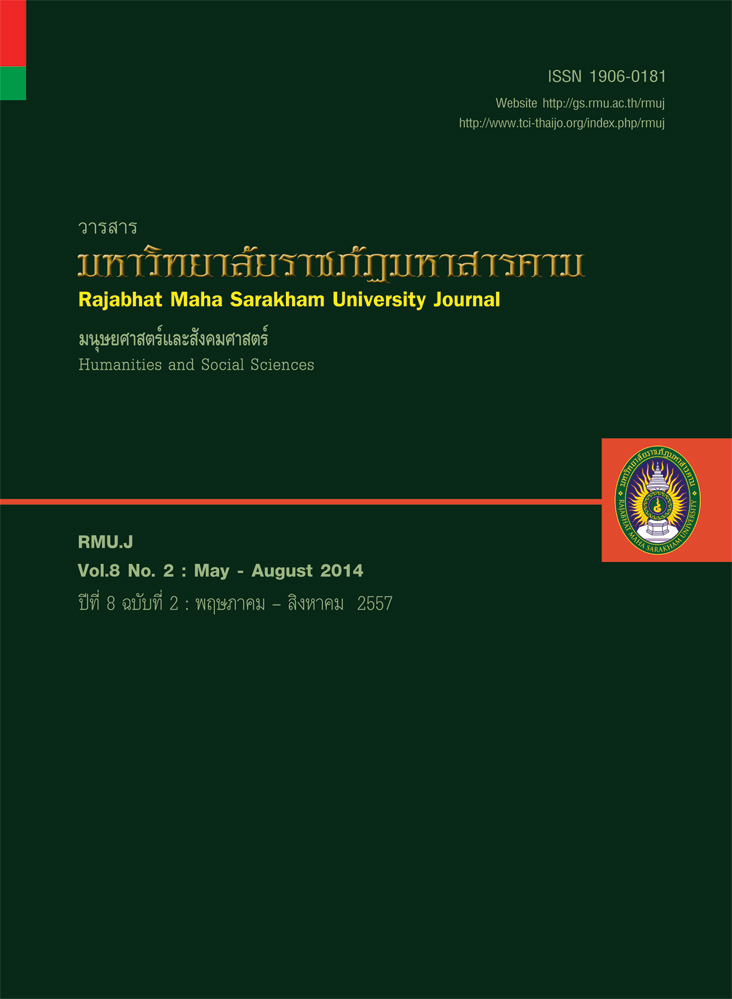การเปรียบเทียบผลการเรียนประเด็นปัญหาทางสังคมที่เกี่ยวข้องกับการใช้วิทยาศาสตร์โดยใช้การ เรียนแบบผสมผสานตามวิธีการทางวิทยาศาสตร์กับแบบปกติที่มีต่อความสามารถในการโต้แย้งและ การคิดเชิงเหตุผลของนักเรียนชั้นมัธยมศึกษาปีที่ 3 ที่มีผลการเรียนวิทยาศาสตร์ต่างกัน
Main Article Content
บทคัดย่อ
การวิจัยนี้มีวัตถุประสงค์เพื่อศึกษาและเปรียบเทียบความสามารถในการโต้แย้งและการคิดเชิงเหตุผลของนักเรียนที่มีผลการ
เรียนวิทยาศาสตร์ต่างกัน ที่เรียนประเด็นปัญหาทางสังคมที่เกี่ยวข้องกับการใช้วิทยาศาสตร์ ด้วยรูปแบบการเรียนต่างกัน กลุ่มตัวอย่าง
เป็นนักเรียนชั้นมัธยมศึกษาปีที่ 3 จำนวน 58 คน จาก 2 ห้องเรียน ภาคเรียนที่ 2 ปีการศึกษา 2555 ได้มาโดยการสุ่มแบบกลุ่ม (Cluster
random sampling) โดยแบ่งออกเป็น 2 กลุ่ม คือกลุ่มทดลอง จำนวน 30 คน จัดการเรียนโดยใช้การเรียนแบบผสมผสานตามวิธีการ
ทางวิทยาศาสตร์ และกลุ่มควบคุม จำนวน 28 คน จัดการเรียนโดยใช้การเรียนปกติ เครื่องมือที่ใช้ในการวิจัย ประกอบด้วย 1) แผนการ
จัดการเรียนรู้โดยใช้ประเด็นปัญหาทางสังคมที่เกี่ยวข้องกับวิทยาศาสตร์ จำนวน 3 เรื่อง ได้แก่ พืช GMOs การทำแท้ง และการเผาตอ
ซังข้าวและอ้อย การเรียนโดยใช้การเรียนผสมผสานตามวิธีการทางวิทยาศาสตร์และการเรียนแบบปกติ รูปแบบละ 3 แผนๆ ละ 3 ชั่วโมง
2) แบบทดสอบวัดความสามารถการโต้แย้ง 4 ชุดๆ ละ 4 ข้อ และ 3) แบบทดสอบวัดการคิด เชิงเหตุผล 30 ข้อ ซึ่งมี 2 ด้าน คือด้าน
อุปนัยและด้านนิรนัย สถิติที่ใช้ในทดสอบสมมติฐานใช้ Paired t-test และ F-test (two-way MANCOVA และ ANCOVA)
ผลวิจัยพบว่า
โดยส่วนรวม นักเรียนที่มีผลการเรียนวิทยาศาสตร์สูง และนักเรียนที่มีผลการเรียนวิทยาศาสตร์ตํ่า ที่เรียนประเด็นปัญหาทาง
สังคมที่เกี่ยวข้องกับการใช้วิทยาศาสตร์โดยใช้การเรียนแบบผสมผสานตามวิธีการทางวิทยาศาสตร์ มีการพัฒนาความสามารถในการโต้
แย้งเพิ่มขึ้นจากการสอบครั้งที่ 14 และมีการคิดเชิงเหตุผลโดยรวมและเป็นรายด้านทั้ง 2 ด้าน เพิ่มขึ้นจากก่อนเรียน (p<.0001) นักเรียน
ที่มีผลการเรียนวิทยาศาสตร์สูงหลังเรียนประเด็นปัญหาทางสังคมที่เกี่ยวข้องกับการใช้วิทยาศาสตร์ มีความสามารถในการโต้แย้งและ
การคิดเชิงเหตุผลโดยรวมและเป็นรายด้านทั้ง 2 ด้าน มากกว่านักเรียนที่มีผลการเรียนวิทยาศาสตร์ตํ่า (p<.0001) นักเรียนที่เรียนด้วย
การเรียนแบบผสมผสานตามวิธีการทางวิทยาศาสตร์หลังเรียนประเด็นปัญหาทางสังคมที่เกี่ยวข้องกับการใช้วิทยาศาสตร์มีความสามารถ
ในการโต้แย้งและการคิดเชิงเหตุผลโดยรวมและรายด้านทั้ง 2 ด้านมากกว่านักเรียนที่เรียนโดยใช้รูปแบบการเรียนปกติ (p<.0001) และ
มีปฏิสัมพันธ์ระหว่างผลการเรียนวิทยาศาสตร์กับรูปแบบการเรียน ต่อความสามารถในการโต้แย้งและการคิดเชิงเหตุผลโดยรวมและรายด้านเฉพาะด้านนิรนัย (p<.0001)
This research was aimed at studying and comparing argumentative and logical thinking abilities of the
students with different learning achievements who learned socio-scientific issues using different learning
approaches. The samples consisted of 58 grade 9th students from two classrooms in 2nd semester of academic
year 2012, obtained through the cluster random sampling technique and they were divided into 2 groups:
the experimental group of 30 students learned by using the mixed methods between the scientific approach,
and the control group of 28 students learned by using the traditional learning approach. The research
instruments for data collection included: 1) learning plans on 3 socio-scientific issues: GM plants, abortion,
and rice and sugar cane straws burning, using the mixed methods between the scientific approach and the
traditional learning approach. Three plans were for each learning approach, and each plan was taught for 3
hours; 2) 4 sets of argumentative tests and each set comprised 4 items; and 3) 30-item-logical thinking test
with 2 aspects of both induction and deduction. The paired t-test, and the F-test (Two-way MANOVA and
ANCOVA) were used for testing hypotheses.
The research findings revealed that the students, as a whole, with high science achievement, and
those with low science achievement who learned the socio-scientific issues by using the scientific approach
showed development of argumentative ability from the 1st to the 4th test; and showed gains in logical thinking
ability, as a whole, and in each aspect before learning (p<.0001). After learning the socio-scientific issues,
the students with high science achievement showed more argumentative and logical thinking abilities, as a
whole and in both two aspects than did those with low science achievement (p < .0001). The students who
learnrd the socio-scientific issues by using the scientific approach showed more argumentative and logical
thinking abilities, as a whole and in both two aspects than did those who learned by using the traditional
learning approach (p<.0001). There were statistical interactions of science learning achievement and learning
approaches on the argumentative and logical thinking abilities, as a whole and in each aspect, especially in
a deduction aspect (p<.0001).
Article Details
1. บทความที่ลงตีพิมพ์ทุกเรื่องได้รับการตรวจทางวิชาการโดยผู้ประเมินอิสระ ผู้ทรงคุณวุฒิ (Peer Review) สาขาที่เกี่ยวข้อง อย่างน้อย 3 ท่าน ในรูปแบบ Double blind review
2. ข้อคิดเห็นใด ๆ ของบทความที่ลงตีพิมพ์ในวารสารมหาวิทยาลัยราชภัฏมหาสารคาม นี้เป็นของผู้เขียน คณะผู้จัดทำวารสารไม่จำเป็นต้องเห็นด้วย
3. กองบรรณาธิการวารสารมหาวิทยาลัยราชภัฏมหาสารคาม ไม่สงวนสิทธิ์การคัดลอกแต่ให้อ้างอิงแสดงที่มา


